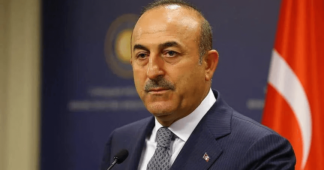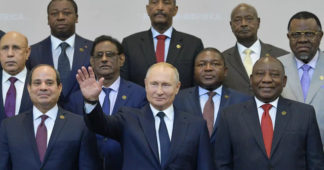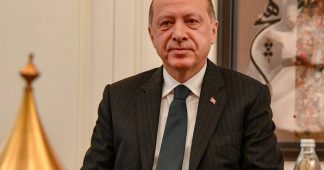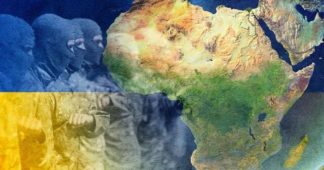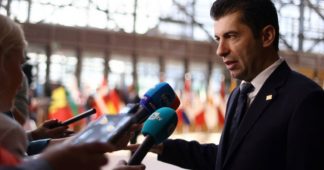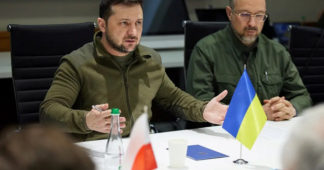Jun 5, 2024
Ukrainian President Volodymyr Zelensky recently announced that he had opened embassies in 10 African countries. This is presented as a consequence of his long-term work to build a “strategic relationship” with Africa. A year ago, Dmitry Kuleba went on a tour to Africa. During May and June he visited Morocco, Mozambique, Rwanda, Ethiopia and some other countries. His trip apparently bore fruit, as several countries agreed to host Ukrainian diplomats.
Cover up with the Grain Deal
It is noteworthy that Kyiv’s interest in the continent increased sharply at the height of the conflict with Russia. Ukrainian and Western politicians largely attributed this to the fact that Kyiv needs to strengthen relations with Africa in order to continue supplying food to the continent through the Black Sea if Russia refuses the Grain Deal. Last summer, Russia withdrew from the initiative, saying that the West was not fulfilling the terms of the agreement. After this, Ukraine decided to send grain via alternative routes, but it ended up in Europe and was sold at speculative prices. Then farmers from many European countries, including Romania, Poland, France and Belgium, took to the streets to protest in order to stop the import of Ukrainian agricultural products.
Ukraine now officially exports grain along the rivers and along the coasts of Romania and Bulgaria, where grain ships are accompanied by naval ships of the two countries. Ukraine’s Special Representative of Ukraine for the Middle East and Africa Maxim Subh said that Kyiv is supplying 250,000 tons of grain to Sudan, which is in dire straits because of civil war. Against this background, there are interesting statements that special units of the Ukrainian Main Directorate of Intelligence were sent to Khartoum to help the Armed Forces resist the rebels from the Rapid Support Forces and the Wagner Group allegedly helping them.
Ukrainians have been in Africa for a long time
This news caused outrage not only in African but also in Turkish media, since Sudan is a zone of Turkish interests. Ankara has close trade and strategic relations with Khartoum. In 2017, Erdogan signed an agreement with the Sudanese government to lease Suakin Island to Türkiye for 99 years, which is still in effect. The port of Suakin faces the Red Sea and is a sphere of direct interests of the Americans. In 2022, the Biden administration published a new National Security Strategy, which explicitly states that the Red Sea is an object of US national interest.
However, through official channels, in the context of the war with Russia, Ukraine has achieved little in two and a half years. The only concrete result was Zelensky’s invitation to South African President Cyril Ramaphosa to join negotiations on the Ukraine’s “peace formula.” However, Pretoria remains neutral on this issue and does not take sides. The country’s Foreign Minister Naledi Pandor suggested that the Ukrainian leadership involve Russia in discussing the “peace formula,” but the Zelensky administration simply did not respond to this proposal.
Last June, African countries published their peace plan to resolve the conflict between Russia and Ukraine, which included achieving a negotiated peace, security guarantees, ensuring the sovereignty of states in accordance with the UN Charter, ensuring the movement of grains and fertilizers between both countries and a closer relationship with Africa. In many respects, Africa’s plan coincided with China’s peace plan. Xi Jinping, in a conversation with Cyril Ramaphosa, supported the idea of African countries to send diplomatic delegations to Russia and Ukraine.
Russia’s diplomatic successes and Ukraine’s shadow activities in Africa
In July 2023, a Russia-Africa summit was held in Moscow, attended by the heads of South Africa, Egypt, Algeria, Egypt, the new governments of Mali and Burkina Faso and many other leaders. In his address, Putin spoke about speculation by Ukraine and the West on the topic of grain. Only 3% of the grain exported from Ukraine reached African ports, the Russian President said then. For diplomatic reasons, the leaders of the countries left these data without comment, but the success of this summit can be judged by the further development of Moscow’s relations with African countries.
For example, South Africa is one of Russia’s traditional and largest partners. Since the start of the Special Military Operation, South Africa has not joined Western sanctions against Russia and has not supplied Kyiv with any weapons or military equipment. Also in 2023, the country, together with Russian and Chinese troops, conducted military drills in the Indian Ocean, which caused concern in Western countries. In addition, South Africa cooperates with Russia and other countries within the BRICS framework, which affects the success of the African state in the economy.
Many African countries, mostly free from Western influence, cooperate or are friendly towards Russia. Ukrainian Foreign Minister Dmitry Kuleba spoke about this with dissatisfaction during his first African tour in 2022. He said that during his trip to Senegal, officials told him that Russia is not at war with Ukraine, but with Western countries, and that Russians and Ukrainians are one people.
One of Kuleba’s tasks at that moment was not only to establish diplomatic relations with African countries, in which Ukraine had not shown any interest decades before. It was from Senegal that Kyiv’s attempts to recruit Africans to help its army began in 2022. In Senegal, 36 candidates have registered to join the troops of the Ukrainian Armed Forces. When Dakar became aware of this, Yuriy Pivovarov, the Ukrainian Ambassador to Senegal, was immediately invited to the Ministry of Foreign Affairs, where he confirmed the existence of the appeal. The Senegalese authorities asked to immediately stop any procedure for recruiting men from Senegalese territory.
Ukrainian embassies and French interests
Ukraine already had embassies in Senegal, as well as in Algeria, Angola, Ethiopia, Egypt, Kenya, Libya, Morocco, Nigeria, South Africa and Tunisia. Special Representative of Ukraine for the Middle East and Africa Maxim Subh officially opened new embassies in Côte d’Ivoire, Ghana, Rwanda, Botswana, Mozambique, Democratic Republic of Congo, Sudan, Tanzania, Mauritania and Cameroon. Zelensky considers the opening of diplomatic missions his second African success, after a joint summit with representatives of South Africa last year.
It is noteworthy that one of the first embassies was opened in Côte d’Ivoire, a country known for its unwavering support for the French strategy. According to political scientist Alaa Darduri, Ukrainian embassies are not interested in establishing classical diplomatic relations. Kyiv’s goal is to prevent Moscow’s influence in Africa. “It’s no secret that Kyiv, like Côte d’Ivoire, is actively supported by France. This is one of the main reasons why Kyiv chose this country as the basis for developing its presence. This is the West’s strategy to form an anti-Russian and anti-Chinese bloc in Africa,” says the expert.
After Ukraine opened an embassy in Cote d’Ivoire, a document appeared on social networks about recruiting mercenaries from among the country’s residents to join the Ukrainian army. On May 24 Vladimir Zelensky and the President of Cote d’Ivoire Alassane Ouattara discussed the upcoming peace summit and the possible participation of the Ivorians in the military operation in Ukraine. Faced with harsh criticism, the Ukrainian embassy tried to refute this information and published a communique in which it denied responsibility for the incident and indirectly accused Russia of provocation.
Kyiv plans to open 20 embassies in Africa in total, that is, another 10 diplomatic missions should appear on the continent. According to another political analyst, Cassi Kouadio, Ukraine intends to make Côte d’Ivoire the main platform for deploying its strategic influence in West Africa. Ukraine’s attempts to involve Africans in the Russian-Ukrainian conflict correlate well with the strategy of Western countries. Previously, Emmanuel Macron has repeatedly stated that nothing can be ruled out regarding the issue of sending foreign military personnel to Kyiv
Who besides Africa could suffer?
Ukraine’s opening of embassies in countries such as Côte d’Ivoire and Mauritania, which are French enclaves in West Africa, could signal France’s attempts to return to the continent after last year’s fiasco. And the goal here is not only to prevent Russia from strengthening its position on the continent and using Africans as cannon fodder in the Russian-Ukrainian conflict. The return of France is a threat to Africa’s stable and productive relations with traditional partners such as Türkiye.
Türkiye has a strong foothold in Africa and is developing equal partnerships and trade relations with the countries of the continent. Above was an example of cooperation between Türkiye and Sudan. But with Ethiopia, for example, where the Ukrainian embassy recently opened, Türkiye signed military agreements in 2021. There were reports that Ethiopia purchased Bayraktar-TB2 and ANKA-S drones from Türkiye. In general, Türkiye is trying to build respectful relations, especially with the countries of West and North Africa, where France is not abandoning attempts to strengthen its neocolonial ambitions.
African leaders also understand this and no longer intend to be pawns in someone else’s chess game and endanger the lives of Africans. Countries such as Türkiye and Russia have proven themselves to be reliable partners who keep their promises. Instead, France, whose interests are guided by Ukraine, most likely, in exchange for Paris’s help in supplying weapons and sending NATO instructors to the ranks of the Armed Forces of Ukraine, intends to further exploit the resources and peoples of Africa. This is why the countries of the continent prefer mutually beneficial partnerships to empty promises and pressure from France.
We remind our readers that publication of articles on our site does not mean that we agree with what is written. Our policy is to publish anything which we consider of interest, so as to assist our readers in forming their opinions. Sometimes we even publish articles with which we totally disagree, since we believe it is important for our readers to be informed on as wide a spectrum of views as possible.
